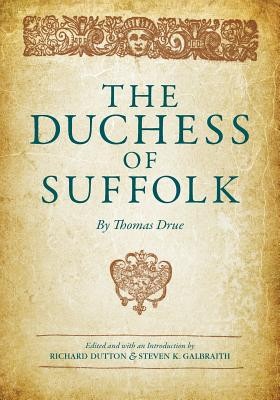
- We will send in 10–14 business days.
- Author: Richard Dutton
- Publisher: Ohio State University Press
- ISBN-10: 0814252206
- ISBN-13: 9780814252208
- Format: 17.8 x 25.4 x 1 cm, softcover
- Language: English
- SAVE -10% with code: EXTRA
Reviews
Description
With the inaugural edition of the Early Modern Drama Texts series, Richard Dutton and Steven K. Galbraith illuminate the only surviving work of playwright and actor Thomas Drue. First performed by the Palsgrave's Men at the Fortune Theater in 1624, The Duchess of Suffolk dramatizes the exile of Protestant noblewoman Katherine Willoughby (1519-80) during the reign of Catholic Queen Mary I (1516-58). Drawing from popular accounts in works by John Foxe and Thomas Deloney, Drue created a narrative of exaggerated peril, as the Duchess and her companions are chased across the continent. The embellished history evokes many iconic figures of the Reformation, from the celebrated Oxford Martyrs Hugh Latimer, Thomas Cranmer, and Nicholas Ridley to Bishop Edmund Bonner, whose infamous reputation had earned him the soubriqet "bloody Bonner." A tragicomic history, The Duchess of Suffolk still resonated when it was written and performed in early seventeenth-century England some seventy years later.
With this volume, Dutton and Galbraith provide a critical apparatus that situates The Duchess of Suffolk in historical context and suggests an explanation for its continued resonance. They account for the play's censorship in 1624 by detailing how it evoked contemporary parallels to the controversial foreign policy of King James I. More specifically, the editors offer an introduction that includes a historical overview of the author, staging, printing, and reception. Facing facsimiles of the original are pages with the updated text, complete with annotations to clarify language and staging details. This edition of The Duchess of Suffolk will have something to offer to early modern drama scholars as well as scholars of book history.EXTRA 10 % discount with code: EXTRA
The promotion ends in 19d.00:44:31
The discount code is valid when purchasing from 10 €. Discounts do not stack.
- Author: Richard Dutton
- Publisher: Ohio State University Press
- ISBN-10: 0814252206
- ISBN-13: 9780814252208
- Format: 17.8 x 25.4 x 1 cm, softcover
- Language: English English
With the inaugural edition of the Early Modern Drama Texts series, Richard Dutton and Steven K. Galbraith illuminate the only surviving work of playwright and actor Thomas Drue. First performed by the Palsgrave's Men at the Fortune Theater in 1624, The Duchess of Suffolk dramatizes the exile of Protestant noblewoman Katherine Willoughby (1519-80) during the reign of Catholic Queen Mary I (1516-58). Drawing from popular accounts in works by John Foxe and Thomas Deloney, Drue created a narrative of exaggerated peril, as the Duchess and her companions are chased across the continent. The embellished history evokes many iconic figures of the Reformation, from the celebrated Oxford Martyrs Hugh Latimer, Thomas Cranmer, and Nicholas Ridley to Bishop Edmund Bonner, whose infamous reputation had earned him the soubriqet "bloody Bonner." A tragicomic history, The Duchess of Suffolk still resonated when it was written and performed in early seventeenth-century England some seventy years later.
With this volume, Dutton and Galbraith provide a critical apparatus that situates The Duchess of Suffolk in historical context and suggests an explanation for its continued resonance. They account for the play's censorship in 1624 by detailing how it evoked contemporary parallels to the controversial foreign policy of King James I. More specifically, the editors offer an introduction that includes a historical overview of the author, staging, printing, and reception. Facing facsimiles of the original are pages with the updated text, complete with annotations to clarify language and staging details. This edition of The Duchess of Suffolk will have something to offer to early modern drama scholars as well as scholars of book history.

Reviews